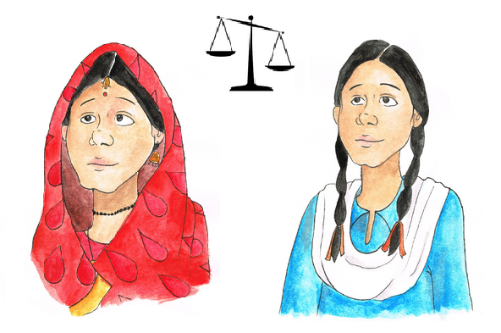Child marriage law, gender norms and marriage customs (Bangladesh)

Image by Maha Rahman, produced for EDI project on “Child Marriage Law, Gender Norms and Marriage Customs”
Focus of the study
Our key research question is: Do laws regarding child marriage (marriage below the age of 18) influence social attitudes and marriage practices when the state has limited enforcement capacity?
This study investigates the effects of child marriage law on marriage customs making use of (i) a new child marriage law in Bangladesh with separate progressive and regressive components, (ii) an existing nationally representative survey on women in Bangladesh with information on attitudes towards traditional marriage practices conducted immediately before the start of public debates that led to the new child marriage law, and (iii) a proposed exogenous treatment aimed at accelerating knowledge transmission about the new law in rural areas.
Broader motivation for the research
A growing literature documents how the timing of marriage for women affects investments in their own education and fertility decisions (Field and Ambrus 2008), social networks and attitudes towards gender norms (Asadullah and Wahhaj 2018), as well as the human capital of the next generation (Sekhri and Debnath 2014, Chari et al. 2017). Thus, marriage timing plays a critical role in the lives of women and their contribution to household production and reproduction.
The elimination of child marriage has become an important policy target for national governments and trans-national bodies. The United Nations Human Rights Council recently adopted a resolution to “eliminate child, early and forced marriage” and the Sustainable Development Goals include the elimination of child marriage as one of its targets (5.3). In conjunction with other strategies, there are ongoing efforts in several developing countries to change marriage norms by introducing harsher penalties for under-age marriage (Amin et al. 2017). However, there is little direct evidence as to whether the law can play a role in shaping the relevant social norms. The proposed case study can potentially bring insights regarding this question.
Research team
- Amrit Amirapu, University of Kent,
- Niaz Asadullah, University of Malaya
- Zaki Wahhaj, University of Kent, (corresponding PI)
- Data Analysis and Technical Assistance (DATA), Bangladesh (research partner)
Research updates:
Watch a video (in Bangla) from recording of an event around this case study on women in Bangladesh. (Video produced by Bangladesh Legal Aid and Services Trust – BLAST.)




